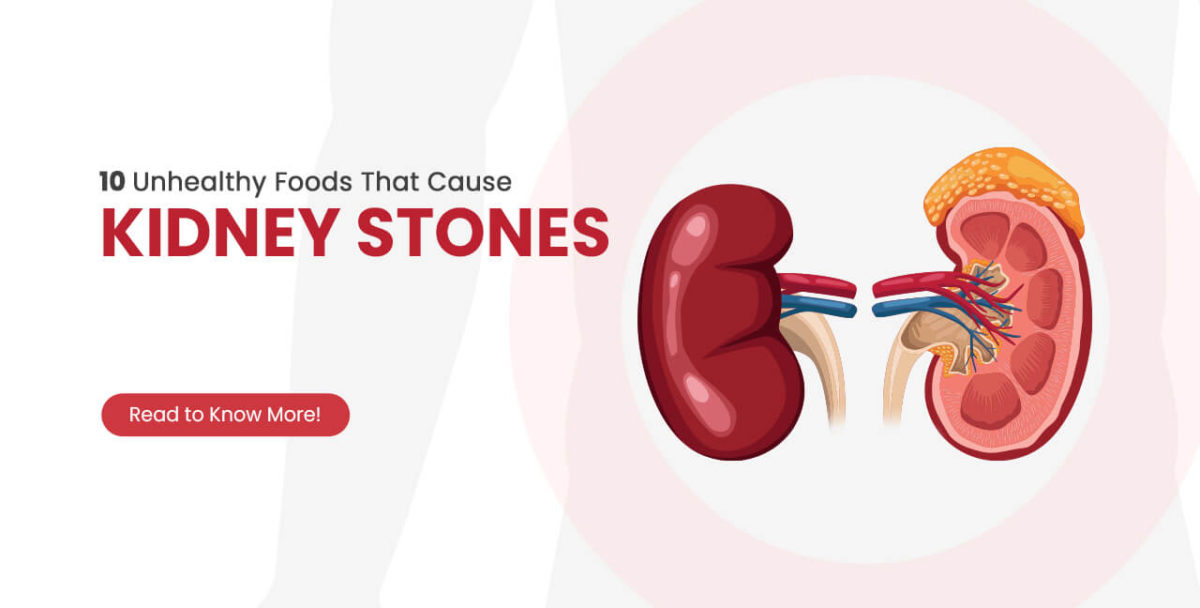
Kidney stones (also known as renal calculi, nephrolithiasis, or urolithiasis) are hard deposits of minerals and salts that form within the kidney. As urine passes through the kidneys, it can become extremely concentrated. When urine becomes too concentrated, calcium, uric acid salts, and other chemicals dissolved in it crystallise to form a kidney stone, also known as renal calculus. Typically, calculus is the size of a little pebble.
Before we go into what foods cause stones in kidneys, let’s go over the reasons for their formation.
The leading causes of stones in kidney
- Insufficient fluid intake
- Chronic infections in urinary tracts.
- Urinary tract obstruction
- Misuse of some medications.
- Genetic and metabolic disorders
- A diet with high uric content
Food to avoid Kidney Stones
Our diet plays a significant role in development as well as the elimination of several diseases including kidney stones. Let’s understand some dietary reasons behind the formation of kidney stones so that we can be better prepared.
1. Consuming Too Much Salt
Salt can increase sodium levels and lead to calcium build up in the body. Always check the labels on packaged and processed foods to see how much sodium they contain.
2. Consuming Foods High in Oxalates
Consuming foods high in oxalates can induce kidney stones, so choose wisely. Foods high in oxalate include almonds, tea, chocolate, beets, spinach, sweet potatoes, and more. Limit your consumption as they are a primary cause of new kidney stones.
3. Reduce Your Animal Protein Consumption
Foods including red meat, pork, eggs, poultry, and fish enhance uric acid production while decreasing citrate levels in urine. Citrate inhibits kidney stone formation. Avoid excessive consumption of these foods.
4. Minimise the Use of Added Sugars
Added sugars, such as syrups in drinks and processed foods, can lead to kidney stones. Monitor sugar intake from cakes, fruits, soft drinks, and juices to prevent stone formation.
5. Carbonated Beverages / Cola
Cola contains phosphate, which can cause kidney stones. Phosphate crystals form when calcium combines with phosphoric acid, producing calcium phosphate stones. Avoid carbonated drinks to reduce risk.
6. Processed Foods
Processed foods often contain phosphorus, a common preservative that can lead to kidney stones. Check packaged or frozen foods for ingredients beginning with “phos” and limit intake.
7. High-Dose Vitamin C Supplements
Excess vitamin C is excreted as oxalates, which can increase oxalate levels in urine and the risk of kidney stones. Avoid taking high doses unnecessarily.
8. Caffeine
Caffeine dehydrates the body by causing fluid loss, which raises the risk of kidney stones. Limit excessive caffeine consumption.
9. Alcohol
Heavy alcohol consumption can cause dehydration, interfere with normal kidney function, and increase the risk of kidney stones.
10. Avoid Fructose-Rich Foods
Fructose-rich foods include high-fructose corn syrup, honey, agave syrup, apples, grapes, and grape juice. Excess consumption can contribute to kidney stone formation.
Treatment of Stone in Kidney
The treatment of stones in the Kidney differs according to the type of stone and its source. If it is small stones with minor symptoms, usually doctors advise drinking 2 to 3 liters of water a day. Pain relievers and medical therapy are also used to relieve the pain of kidney stones. If you have developed a large stone, then using then doctors may even use sound waves to break the stone. In severe cases, doctors may also perform surgery to remove the stone from the Kidney.
Kidney stones can be annoying and excruciatingly painful at worst. To prevent your situation from worsening, you should see a healthcare provider as soon as possible. The pain can become severe, and surgery may be required. Ensure to take your prescriptions on time, drink plenty of water, and adhere to any dietary advice. Remember that kidney stones are a transitory condition. They will not trouble you forever.
Also Read: Top 10 Foods for Kidney Health

 Call-an-Ambulance
Call-an-Ambulance



